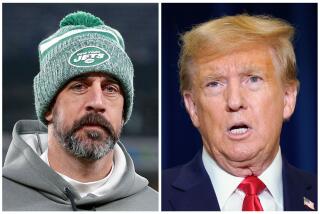Proper way to reach a sorry state
- Share via
It’s just one little word. You’d think it’d be simple. “Sorry.” But there’s sorry and then there’s sorry, particularly in politics. So many public figures in recent years have apologized for so much that the public mea culpa has become, like public misdeeds, a kind of convention -- part emotion, part ritual art form.
So it was Thursday that California weighed its latest public act of contrition, the one that was either for being “playful” or for sexual harassment, depending on your viewpoint.
“Yes, it is true that I was on rowdy movie sets and I have done things that were not right, which I thought then was playful but now I recognize that I offended people,” Arnold Schwarzenegger, the actor and gubernatorial front-runner, said at a campaign rally, hours after The Times published allegations from half a dozen women who said he’d groped and humiliated them as far back as 1975 and as recently as three years ago.
“Those people that I have offended, I want to say to them I am deeply sorry about that and I apologize because that’s not what I’m trying to do.”
In the aftermath, given the fast-forward nature of pretty much everything about the California recall, the question in many circles was not so much whether he meant it but: How’d it play?
“It works,” said James B. Twitchell, author of “For Shame: The Loss of Common Decency in American Culture” and a professor of English and advertising at the University of Florida. “He could have done a wimpy, Michael Dukakis-like apology, but he said, in effect, ‘You know the world I’ve moved in. I’m the Terminator. It’s showbiz. What do you expect?’ ”
Uh-uh, said public relations expert Gershon Kekst of Kekst & Co. in New York. “A public apology is a very important thing to do when it’s sincere and credible,” he said. “But if the public has the sense that it’s staged, it’ll boomerang. A serious and sincere apology requires you to be big enough to say, ‘I did the wrong thing and am deeply sorry.’ But if it’s perceived as a political contrivance, not only do I not give you points, I take them away.”
Maybe, mused Michael S. Sitrick, whose Century City-based firm specializes in crisis public relations.
“It’s a kind of combination explanation and apology, as opposed to just an apology. He’s saying, ‘Look, if I did something, it was inadvertent.’ ”
To describe Schwarzenegger’s apology as “only the latest” is to make one of the larger understatements in modern history. There was Richard Nixon’s 1952 “Checkers” speech in response to accusations that he had dipped into a “slush fund,” the “sorry” by which all political “sorrys” have been measured since. He went on the air, famously detailing everything from his misdeeds to the cost of his mortgage to his little dog’s name, and then threw himself on the mercy of his party.
Famously, it worked.
Since then, the political and public apologies have been honed to a fine art, though not all public figures can muster the will to do what it takes in the end. Some -- the super-paid New York Stock Exchange ex-chairman Richard Grasso, for instance -- just can’t say it. Others can’t work up the confidence and the will to say what needs to be said in time to control the damage.
There was former President Bill Clinton’s way-late mea culpa in the Monica Lewinsky matter, and Sen. Trent Lott’s drawn-out, escalating apology for remarks he made that seemed to condone racial segregation. There was Cardinal Bernard Law’s drib-and-drab admission of “sadness and shame” for the abuse of children by “some priests” before he stepped down and the now-ex-Rep. Gary Condit’s quasi-sorry about the disappearance and death of Chandra Levy. “I hope you also understand that I am not perfect and have made my share of mistakes,” he -- insufficiently -- said.
The line of apologists is long and venerable and has grown as public service has come to intersect entertainment. Sports figures do it, chief executives do it, even media stars now do it.
Even if they don’t always work, though, public apologies serve an important purpose. As Sitrick points out in his book, “Spin,” when combined with a promise and, even better, a plan to reform, they allow the public to forget the bad thing you did and move on.
“To get the press to stop focusing on what you did wrong yesterday, you’ve got to do something right today,” writes Sitrick.
“If the apology is surrounded by an explanation, that’s what’s important,” he said. “Just saying ‘sorry’ isn’t enough.”
In fact, a good apology, like any effective public act, has come to be viewed as simply another branding opportunity, said Twitchell.
“In the realm of Brand Arnold, that apology is nicely crafted to fall between the Sylla and Charybdis of remorse and no-remorse,” he said.
“Nothing is more effective than a strong guy who acknowledges weakness. And Arnold’s brand is literally and figuratively strong.”
More to Read
Sign up for Essential California
The most important California stories and recommendations in your inbox every morning.
You may occasionally receive promotional content from the Los Angeles Times.













